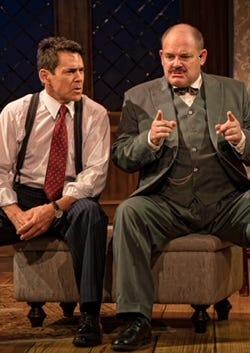One balmy evening before the war …
Review: Agatha Christie's Black Coffee at Theatre on the Bay
Having a pre-show drink in the bar at Theatre on the Bay always feels like a visit to another time. Anyone younger than 75 will find themselves offering seats to their elders. You would be well advised to leave plenty of time to order your drinks especially if, say, Colonel Mustard (who wanders into the queue in front of you, not intentionally being rude, just a bit oblivious) mistakes the barman for a cricketer from the West Indies and random chatter ensues.
The bar staff always do their best to keep things moving (with the patience of saints!). Don’t let any of it bother you; a drink in the bar is an excellent set-up for an Agatha Christie country house murder mystery (well maybe sans the murder and mystery parts, from my own experience anyway).
After our little taster at the bar, Agatha Christie's ingenious murder mystery Black Coffee served up a full feast of humour and intrigue, followed by black coffee, of course. The show, directed by Alan Swerdlow, was charming, confounding, impressive, intelligent and very funny.
As expected, Alan Committie was bang-on, a funny, super-quirky Hercule Poirot. Call Off The Search’s resident Poirot fan said that somehow the show stayed absolutely true to the best of Agatha Christie even with an extra layer of classic quirky curious Committie.
The audience is quickly pulled in by strong performances all round and brilliant set, props and costumes by Sarah Roberts. A quick straw poll at the interval confirmed that each quirky character had won over different audience members.
We know from the get-go that one of them is guilty or will soon be guilty (in this case both) and we each hope it is not him … or her, or … her or … him. Like the best whodunnits, we find ourselves hoping that none of them has dunnit, though we know someone must have.
The audience’s connection with the characters is often tested by their playful expression of all sorts of character flaws and lots of classic prejudice. It is all so subtle that we often find ourselves giggling before we can ‘woke up’. Often we are laughing too hard to wonder: ‘Do we laugh, or do we squirm?’ A genteel lady wouldn’t think to write a lot of this today.
There are plots on plots and underpinning it all is the prophetic concept of an atom bomb that will drastically multiply the number of casualties of war.
You might wonder how Agatha Christie knew about an atom bomb in 1929. While the bomb itself didn’t exist, the idea of atomic energy as a powerful force, potentially for destruction, was already being debated in science and fiction. The chilling foresight adds a layer of reality and urgency to the play’s intrigue.
This is Europe between the wars. Suspicions are high, as are the stakes of solving this particular mystery since that would likely avert human casualty at scale. So, was it an enemy spy or a jilted lover, a potential heir, or some other dodgy party. No one but Monsieur Hercule Poirot, everyone’s favourite Belgian detective, could unravel this mess, and he does it with such cunning, clarity and charm.
There was not a slacker in this cast, but standout performances for us were delivered by Dianne Simpson (Barbara Amory), Ashley Dowds (Captain Arthur Hastings OBE) and Anne Williams (Caroline Amory).
The show runs for around 2.5 hours (including a 20-minute interval), but it didn’t feel a minute too long.
Agatha Christie’s Black Coffee runs at Theatre On The Bay until 26 April, before transferring to Pieter Toerien’s Montecasino Theatre in Johannesburg from April 30 to June 1. Tickets: R180-R300.
Fun facts
Black Coffee premiered at the Embassy Theatre in London in December 1930.
Pieter Toerien previously presented Black Coffee at the Baxter Theatre from 13 December 1984 to 5 January 1985, directed by Rex Garner, and starring Bill Flynn as Hercule Poirot. The production toured to Cape Town, Johannesburg, Port Elizabeth and Durban.
Black Coffee was Christie’s first original play, and established her as the Queen of West End thrillers.
She wrote 66 detective novels and 14 short story collections, in addition to her plays, including the world's longest-running play (that we, in the West, know of), The Mousetrap.
Agatha Christie published six romance novels under the name Mary Westmacott, exploring human psychology and relationships. She kept her identity as Mary Westmacott unknown for nearly 20 years and the books, much to her pleasure, were modestly successful.
Christie’s novels have sold over 2 billion copies, surpassed only by the Bible and the works of William Shakespeare.








Sounds like a superb night out - thanks for the review
Lovely